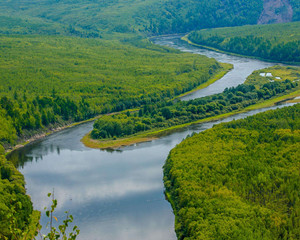But as soon as the first frosts of September announce the approach of winter, all animals, with but few exceptions, hasten to leave a region where the sources of life must soon fail. The geese, ducks, and swans return in dense flocks to the south; the strand-birds seek in some lower latitude a softer soil which allows their sharp beaks to seize a burrowing prey; the waterfowl forsake the bays and channels that will soon be blocked up with ice; the reindeer once more return to the forest; and in a short time nothing is left that can induce man to prolong his stay in the treeless plain. Soon a thick mantle of snow covers the hardened earth, the frozen lake, the ice-bound river; and conceals them all—for seven, eight, nine months at a time—under its monotonous pall, except where the furious north-east wind sweeps it away and lays bare the naked rock.
然而,当九月迎来了第一场雪并再次宣告冬天的到来之时,除了少数例外,几乎所有的动物都匆忙离开了这片生命之源即将枯竭的地区。鹅、鸭子和天鹅成群结队回到了南方;海鸟们则回到了低纬度地区寻找较为松软的土壤以便能把自己那尖利的喙插进洞穴寻觅穴居生物;水鸟们也抛弃了即将被冰封的海湾和沟渠;驯鹿们再次回到了森林;很快人类便再也没有可以让他们继续逗留在这片无树木生长的平原上的理由了。不久之后,厚厚的大雪终于将这片坚硬的土地覆盖,湖泊结上了冰,河流被彻底冰封;大雪一次性将一切全部尘封在了它那片单调的雪白之下,时间长达七个月、八个月、甚至九个月之久,只有当猛烈的东北风刮来,在那些雪层被吹开的地方,能露出那光秃秃的岩石。

This snow, which, after it has once fallen, persists until the long summer day has effectually thawed it, protects in an admirable manner the vegetation of the higher latitudes against the cold of the long winter season. Thanks to this protection, and to the influence of a sun which for three or four months together circles above the horizon, and in favourable localities calls forth the powers of vegetation in an incredibly short time, even Washington, Grinnell Land, and Spitzbergen are able to boast of flowers.
这雪一旦下了便只得等到漫长的夏日来临将它融化,这也是雪在以一种值得称颂的方式保护着高纬度地区的植被免受冬季寒冷长久的侵蚀。多亏有了这种保护,还有盘旋在地平线之上的太阳给予的那三四个月的光照,加之有利的地理位置,植被们才得以在极短的时间内再次换发生机,也使得华盛顿、格林内尔兰和尔根群岛这样的高纬度地区能因其盛开的鲜花而吹嘘不已。
The Arctic forest-regions are of still greater extent than the vast treeless plains which they encircle. When we consider that they form an almost continuous belt, stretching across three fourths of the world, in a breadth of from one thousand to fourteen hundred miles, even the woods of the Amazon, which cover a surface fifteen times greater than that of the British Isles, shrink into comparative insignificance. Unlike the tropical forests, which are characterized by an endless variety of trees, these northern woods are almost entirely composed of cone-beares, and one single kind of fir or pine often covers an immense extent of ground.
北极森林地区所覆盖的面积仍然要比那片辽阔的无树木生长的荒原地区还要宽广。我们认为北极森林地区横跨了地球四分之三的区域,且其宽度介于1000英里到1400英里之间,是一片几乎连绵不断的地带,跟它比起来就连面积比不列颠群岛大了十五倍的亚马逊森林也变得微不足道了。北极森林地区和以树木种类繁多为特征的热带森林地区不同,北方森林里几乎全是针叶树,而且仅仅一种冷杉或者松树就能占据很大一片区域了。
Another peculiarity of these forests is their apparent youth. This is sufficiently explained by the shortness of the summer, which, though able to bring forth new shoots, does not last long enough for the formation of wood. Hence the growth of trees becomes slower and slower the farther north they are found.
北极森林的另一个特征是树木格外的嫩,短暂的夏季就足以说明这一点。夏季虽然能使树木发出新芽,但却因其持续时间较短而并不足以使之长成大树。因此,在北极森林地区,越往北的地方树木生长的速度则越缓慢。
A third distinctive feature of the Arctic forests is their harmless character. There the traveller finds no poisonous plants; even thorns and prickles are rare. No venomous snake glides through the thicket, no crocodile lurks in the swamp. Even their beasts of prey—the bear, the lynx, the wolf—are less dangerous and blood-thirsty than the dreaded monsters of the torrid zone.
北极森林的第三个显著特征是无害性。旅行者们在北极地区是找不到有毒植物的,就连针刺和荆棘也尤为罕见。在那里没有毒蛇在丛林中游弋,也没有鳄鱼在沼泽里潜伏。即使是生活在那里的食肉动物熊、猞猁和狼也没有热带地区的那么危险和嗜血。













